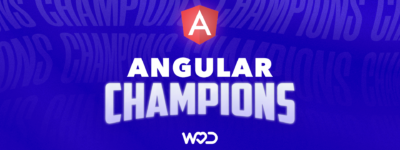Jobs for Angular developers | 90+ jobs
Discover our jobs dedicated to developer Angular developers and techs. Developers working on developer Angular are in high demand!
This text has been translated from Google Translate.
AngularJS was a revolution in 2016. Before it took hours of doing AJAX or AHAH to bind data and render HTML in a heavy application.
The folks at Google were early adopters. Because the double data binding allowed them to rewrite in two weeks a SPA (Single Page Application) that they had taken several months to write.
I discovered Angular (AngularJS) in its first version. The bookstore's approach was revolutionary. - Quentin Schuler, Angular Champion on WeLoveDevs, read his portrait
What is the difference between Angular and AngularJS?
AngularJS is the first version of Angular. Except that Typescript became popular then. Angular developers decided to rewrite everything with Typescript and the new version no longer had Javascript's JS in its name.
What are the main versions?
1.AngularJS
2. Angular (or Angular 2)
3. Angular 4 to 7
4.Angular 12
In the early days of Angular, it was very common not to use Typescript in their application. Also this paradigm has changed and versions 4 to 7 are designed for you to use Typescript in your application.
Starting with version 8, Angular introduces the Ivy renderer which aims to be as efficient as React Fiber and its Hooks. And that changes everything. An Angular developer who has never seen an application on Angular 4 to 7 will be completely lost. And reciprocally.
This is also why on WeLoveDevs you will find MCQs for the Legacy versions: Angular 4 (Legacy) and AngularJS
But go test your skills on the latest Angular framework with this MCQ written by Emmanuel Demey
Who uses Angular?
Angular is often associated with Java. It turns out that jHipster for example offers Java / Spring and Angular templates. But it is also widely used in DotNet stacks.
In reality Angular is widely used for corporate applications and rightly so. The framework is less permissive than React, all projects look the same. It's easy to switch from one Angular application to another. The maintenance cost in a company where there are many developers is significantly lower.
We make mobile applications with Angular. Indeed, there is a framework called Ionic. In reality it will probably never be as popular as React-Native or Flutter because it is based on Cordova. But it offers beautiful templates, it's a real UIKit in itself and you can make a business application quickly with it without leaving your comfort zone. And we have a MCQ on Ionic Framework if you want to test yourself!
Our articles about Angular

